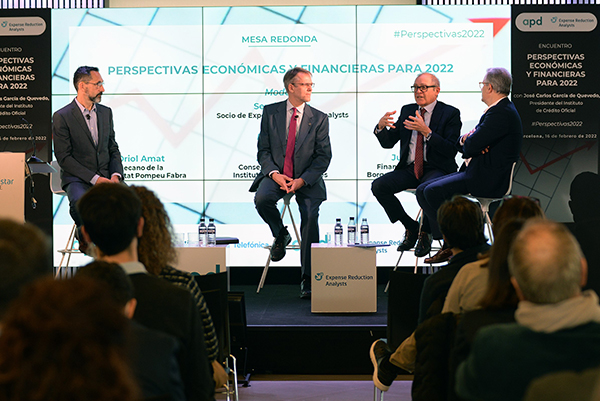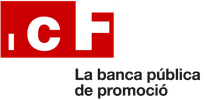Jordi Òliva, the financial institution’s CEO, spoke at a panel discussion on the economic outlook alongside Oriol Amat, dean of the UPF Barcelona School of Management (UPF-BSM), and Juli Teclas, CFO at Borges International Group.

On Wednesday 16 February, the ICF was at a conference on the economic and financial outlook for 2022 hosted by the APD (Association for the Progress of Management). The financial institution’s CEO Jordi Òliva spoke at a panel discussion alongside Oriol Amat, dean of the UPF Barcelona School of Management (UPF-BSM), and Juli Teclas, CFO at Borges International Group.
Economic growth and recovery were the main themes of the conversation. Jordi Òliva pointed out the need for business financing to unlock investment projects which create jobs and add to GDP. “We’re at a turning point between the toughest stage of the pandemic and the lifting of restrictions as the health crisis eases,” he argued. “This is a crucial time when the ICF as a public financial institution should stand alongside businesses looking to embark on growth projects.” Juli Teclas added that the trick for enterprises to turn the corner and get back on their feet is to build their projects on sustainability and digitalisation. However, he also noted that “many SMEs and micro-enterprises, which make up the bulk of the business community, are still unsure about how to roll out this type of initiative.”
The speakers agreed on the key role of banking over the last two years. Òliva underscored some of the solutions which have been put in place including Covid-19 loans, grace periods and ICO guarantees along with the work done by financial institutions to “make provisions in line with the principle of prudence to safeguard the stability of the financial sector.” Meanwhile, Oriol Amat praised “the rapid response of the European, national and Catalan authorities in implementing solutions to cope with the impact of Covid-19.”
Looking ahead to the coming months, Juli Tecles warned about the potential threat to growth posed by rising costs stemming from the supply and raw materials crisis and inflation in the euro area and the United States. Similarly, Amat pointed out that ongoing political destabilisation and the prospect of higher interest rates might trigger a stock market slump. Òliva called for public-private partnerships to ensure that business support initiatives such as the EU’s NextGeneration funds are translated into real projects.
The event wrapped up with the presentation “ICO operations for business recovery and transformation” in which José Carlos García de Quevedo, the chair of the Official Credit Institute, reviewed the institution’s initiatives and action strands for the business community designed to unleash growth, employability and competitiveness.
